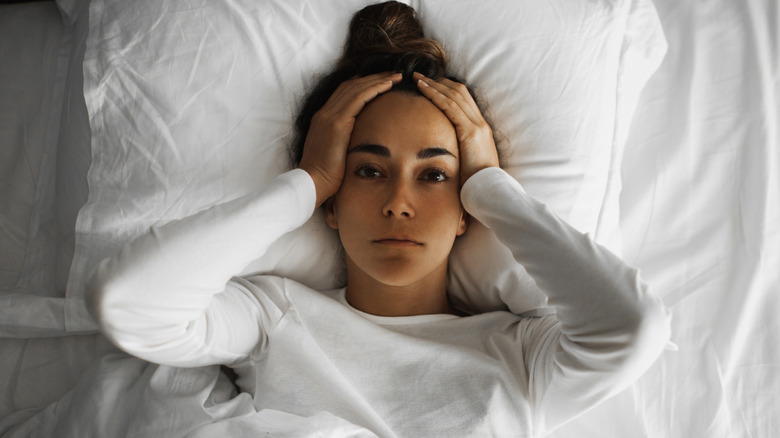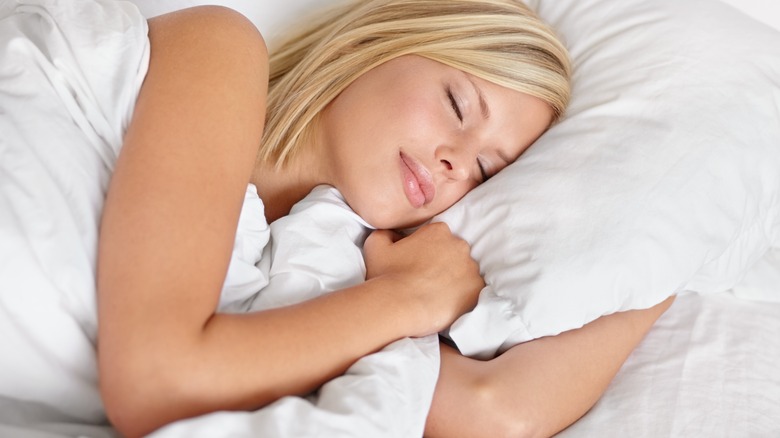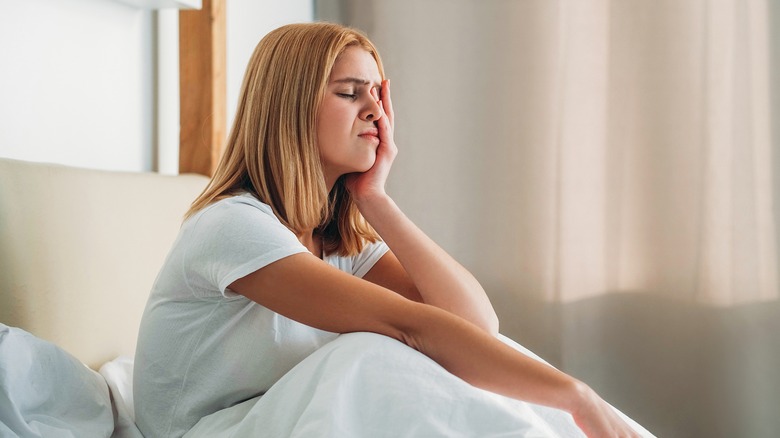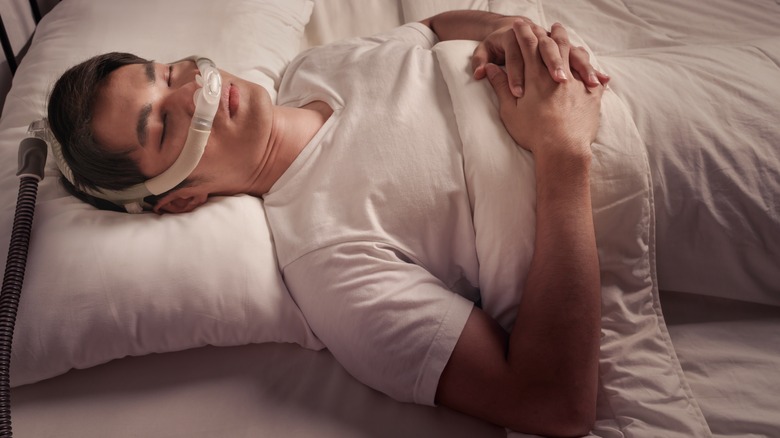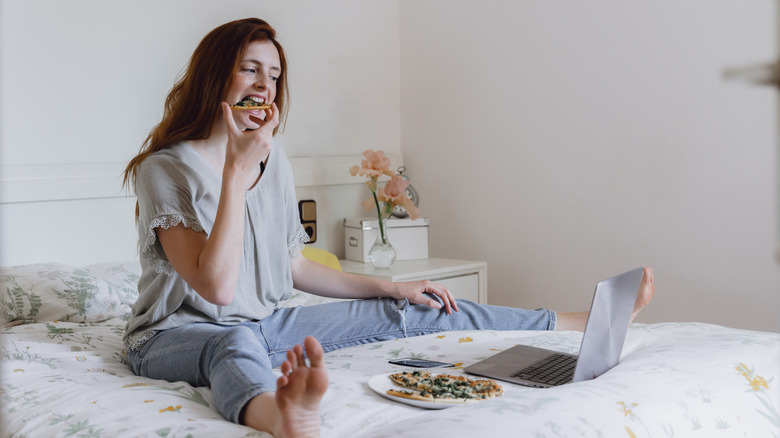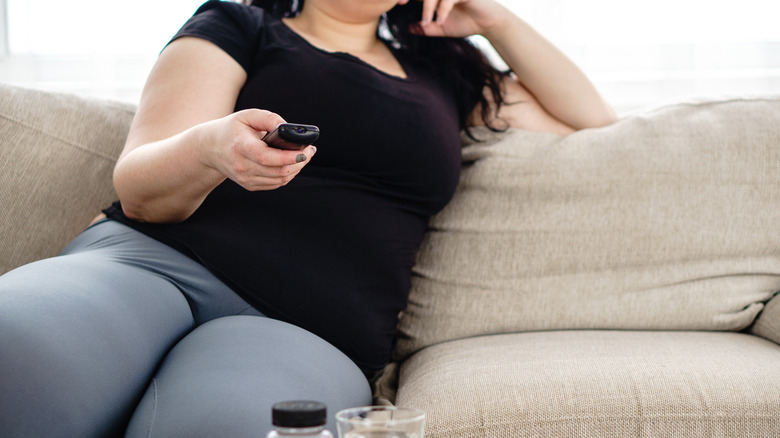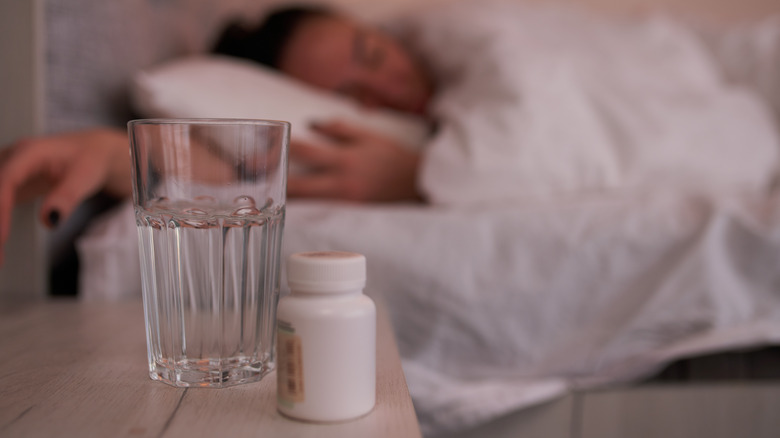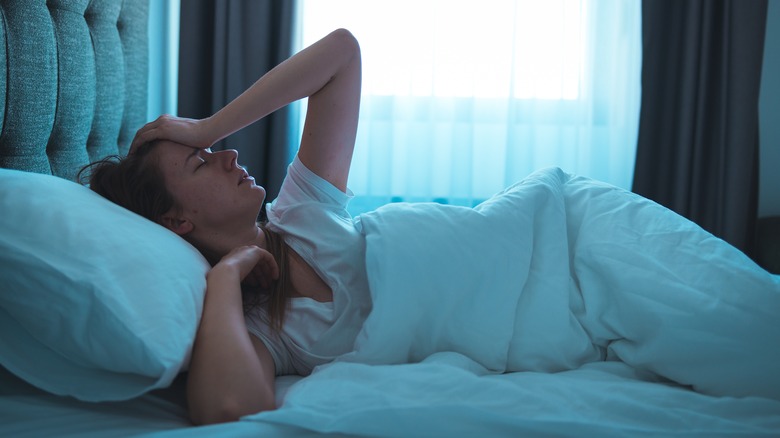13 Sleep Mistakes That Can Increase Your Early Death Risk
We do it every single night of our lives. Per experts' estimates, an average person spends approximately one third of his or her life asleep (via the Handbook of Clinical Neurology). Unfortunately, that level of practice doesn't always seem to make perfect. According to a 2006 report published by the Institute of Medicine, as many as 70 million U.S. adults suffer from some kind of sleep disorder. Additionally, the National Heart, Lung, and Blood Institute reports that almost 40% of adults have reported inadvertently falling asleep during the day at least once a month.
Sleep deprivation and poor sleep habits can lead to a number of health issues over time. When we sleep, the brain flushes out toxic waste proteins that can accumulate throughout the day. When we have bad sleep habits, our brains are unable to clean out these proteins. As a result, lack of proper sleep can lead to such cognitive conditions as Alzheimer's disease. In addition, poor sleep makes it harder to regulate our emotions, which means that bad sleep habits can lead to anxiety and depression. There is also a health risk of developing such conditions as hypertension, high cholesterol, and diabetes. Avoiding these key mistakes can help you not only get your rest, but also keep you healthy in the long run.
Sleeping too much
Everyone likes a good night's sleep, and some mornings, it can be very tempting to stay in bed longer than the recommended eight hours. However, according to Johns Hopkins Medicine, oversleeping is linked to a number of chronic health problems, including, among others, type 2 diabetes, heart disease, obesity, and depression. Additionally, Premier Health reports that, in adults over the age of 45, too much sleep can increase the risk of developing such chronic illnesses as heart disease, diabetes, anxiety, and stroke. Some of these findings are bolstered by a 2014 study published in PLOS One. That study showed that so-called "long sleepers," people who tended to sleep more than ten hours per day, had a higher body mass index and were far more likely to have psychiatric issues.
A 2018 study published in the Journal of the American Heart Association showed that people who slept for more than eight hours had an increased risk of cardiovascular disease and dying prematurely. For people who slept for more than nine hours, the risk of dying young was as high as 23%. Those who were really long sleepers, putting in up to 11 hours a night or more, could face a risk of early death as high as 50% or greater.
Going to bed too late
Many people are so-called "night owls," preferring to stay up late into the night, reading, watching TV, or scrolling through devices, reading social media posts, or watching TikTok. While it's OK to prefer to go to bed later than others, staying up too long can begin to cause problems if one isn't careful. A 2021 study published in the Journal of Youth and Adolescence revealed that teenagers who tend to stay up late had a greater tendency towards substance use and abuse, and to also engage in riskier behaviors, than those who went to bed at a more reasonable hour.
Mood can also be affected by a later bedtime, as evidenced by a 2021 study published in Biomolecules. That study revealed that people who tend to stay up later during the evenings can be more predisposed to mood or personality problems. They may also suffer from eating disorders and other mental and psychiatric issues. In addition, chronically staying up late may actually shorten your lifespan, according to a 2023 study published in Chronobiology International. That study found that night owls were 9% more likely to die young than those who observed an earlier bedtime.
Irregular sleep patterns
People who tend to have a hard time falling asleep or who are prone to waking up frequently during the night could face a host of issues, including dying young. According to a 2021 study published in the Journal of Sleep Research, people who had difficulty falling asleep at night had an increased risk of up to 44% of an early death. People who woke up during the night and struggled to get back to sleep saw their risk climb as high as 56%. The study also showed that people with irregular sleep habits had an almost 50% increased risk of developing dementia.
Additionally, a 2023 study published in the Journal of the American Heart Association showed that people who had irregular sleep patterns were 1.4 times more likely to develop arterial plaque buildup. This was, at least in part, due to the fact that people who slept less and had overall irregular sleep patterns also had a tendency to lead unhealthy lifestyles, with poor diets and less physical activity. In addition, sleep is important to allow the heart to rest and recover. Depriving the body of sleep forces the heart to continue working harder, leading to stress over time.
Drinking alcohol and caffeine later in the day
While it's true that, glass of wine (or other alcoholic beverage) before bed can help you fall asleep, according to the Sleep Foundation, in the long run, it could end up doing more harm than good. Even a moderate amount of alcohol can impact your sleep quality by more than 9%, while higher amounts can disrupt sleep patterns by close to 40%. Alcohol also has the ability to disrupt a person's REM sleep patterns (via Piedmont Healthcare). Known as Rapid Eye Movement (REM) sleep, this is when a person has their most vivid dreams and is when the restorative abilities of sleep are at their highest. Additionally, heavy alcohol use can, over time, lead to chronic conditions like insomnia.
Caffeine before bed, even in small amounts, can also present significant problems with sleep patterns. A 2013 study published in the Journal of Clinical Sleep Medicine showed that even a moderate dose of caffeine taken as far out as six hours before bed can lead to sleep disturbance. The study found that consuming caffeine that far out could reduce one's total sleep time by up to one hour. And, in older adults, the effects could be even greater.
Sleeping with electronics
There's no shame in admitting that you look at your phone, iPad, or laptop before bed. We've all been guilty of it from time to time. However, the blue light that these devices emit is a real sleep killer. According to the Society of Behavioral Medicine, keeping the lights low at bedtime lets the body know to release melatonin, a hormone that gives the signal that it's time to sleep. Blue light generated by electronics can cause a slowdown in the release of melatonin, which can disrupt the body's circadian rhythm.
This effect on your sleep quality can have detrimental effects in the long term. UC Davis Health reports that blue light can lead to problems with your vision, including age-related macular degeneration, cataracts, and eye cancer. It can also lead to eye strain, given the fact that people using devices tend to blink less while scrolling.
Ignoring sleep apnea symptoms
A condition that causes you to stop breathing during sleep, sleep apnea can happen because of a blocked airway or due to a condition that prevents your brain from properly managing your breathing (via Cleveland Clinic). The condition can cause the affected person to wake up during the night as they struggle to breathe. As a result, they are often tired during the day from not having gotten a full night of unbroken sleep. Apnea also has a number of associated symptoms, including depression, anxiety, memory loss, and unusual breathing patterns.
Because, as the name implies, sleep apnea happens when the affected person is asleep, they may either not be fully aware that they have the condition or even be unwilling to address it. However, Johns Hopkins Medicine notes that ignoring sleep apnea can lead to serious consequences. Being tired and groggy during the day can impact one's productivity at work, cause mood swings, and could even be deadly if, for example, the affected person were to fall asleep behind the wheel. Additionally, there are links between sleep apnea and cardiovascular problems, stroke, and type 2 diabetes.
Keeping irregular mealtimes
Our circadian rhythm is dependent on our body's internal clock functioning properly (via the BBC). Part of keeping that clock running is maintaining regular mealtimes. Eating is a way of giving your body the cues it needs to stay balanced during both the day and night. If you start ping-ponging around with your meals, eating at irregular times, your rhythm will be off, and so will your sleep patterns.
As an example of how irregular mealtimes can negatively impact both your sleep and your health, a 2022 study published in the Journal of Clinical Sleep Medicine showed that shift workers are at a higher risk for a number of health problems, including diabetes and heart attacks. This could partially be attributed to the fact that, as reported by a 2023 study published in Advances in Nutrition, rotating shift workers tend to have more irregular meal times and have a habit of eating less healthy foods and more foods that are high in sugar, salt, and saturated fat.
Living a sedentary lifestyle
People who live a sedentary lifestyle, which is typically defined as spending six or more hours a day either sitting or lying down, are opening themselves up to a variety of health risks (via HealthPartners). It can also impact your sleep, as the lack of movement throughout the day may lead your body to think that it doesn't need to rest. That lack of sleep translates to fatigue during the day and, when combined with an overall inactive lifestyle, can also lead to health problems such as hypertension, high cholesterol, and diabetes.
A 2019 study published in the International Journal of Environmental Research and Public Health showed a direct correlation between sedentary behavior and poor sleep. The study revealed that people with low physical activity were more likely to suffer from poor sleep as well as other sleep-related problems such as snoring, breathing stops, and gasping for air during the night.
Not staying hydrated
The importance of staying hydrated during the day is well known, but it's just as crucial to make sure that your body is hydrated enough to see you through the night. While you sleep, your body releases a hormone called vasopressin, which helps to retain water (via the Sleep Foundation). However, if you haven't been drinking enough water throughout the day, you could experience such sleep-disrupting symptoms as headaches, cramps, and dry mouth.
While it's not fully known exactly how dehydration impacts sleep, Sleep Doctor posits that dehydration-induced headaches may affect sleep and that dehydration could also make the symptoms of obstructive sleep apnea worse. In addition, poor sleep habits can affect dehydration, as the production of vasopressin and conditions such as night sweats can cause you to lose water while you sleep. If you're already not properly hydrated, this can be an issue. As such, it's important to stay hydrated throughout the day, drinking when you're thirsty and keeping a water bottle with you.
Sleeping in the wrong position
During the night, we tend to find a comfortable position and stick with it for hours, maybe even the entire night. However, if you choose your sleeping position poorly, you could be opening yourself up to some serious issues. According to Coastal Orthopedics, your sleep position could be causing you to wake up in pain and could lead to more pressing neck and back problems down the road. If you're sleeping on your stomach with your head turned to the side, for example, you could be putting strain on your neck. The fetal position, a particularly popular sleeping position, can lead to stiffness and soreness in your muscles, ligaments, and tendons.
Sleeping on your stomach is another unhealthy position, according to Samitivej Hospitals. This position can inhibit breathing and also wreak havoc on your spine. When a person sleeps on their stomach, their head is turned to one side. This can cause inflammation of the neck muscles while also causing back pain at the same time. Another dangerous position is sleeping while resting your head on your upper arm. This can place pressure on the radial nerve, which could lead to nerve damage in the long run.
Relying too much on sleeping pills
According to WebMD, more than a third of Americans have some trouble sleeping, and, as a result, many of them turn to sleeping pills in order to help them get a good night's rest. These sleeping aids can range from benzodiazepines such as Valium or Xanax, to drugs prescribed for sleep such as Lunesta or Ambien, to over-the-counter medications like Unisom. Not only can many of these drugs become habit-forming, but they can also have a number of side effects. Ambien and Lunesta, for example, can cause burning and tingling in the extremities, headaches, and gastrointestinal problems such as constipation and diarrhea.
Additionally, the Cleveland Clinic reports that long-term sleeping pill use can cause more serious problems, including a disorder known as parasomnia. This is a condition marked by engaging in dangerous behaviors while asleep. These behaviors can include sleepwalking, eating, and even driving while asleep. Additionally, if you suffer from sleep apnea, these medications can actually worsen your symptoms.
Thinking you can catch up on sleep
Although we all ideally need around eight hours of sleep every night, there are often forces that conspire to cut into that time. Whether it's work responsibilities or binge-watching the latest show on Netflix, little things eat away at our required sleep time. Over time, this builds up what is known as "sleep debt" (via WebMD). This sleep debt can accumulate the more nights you lose sleep, and, before you know it, you can accrue 24 hours or more of debt. This can lead you to feel tired during the day, make it harder for your brain to process information, and weaken your immune system.
Most people who find themselves dealing with the effects of sleep debt tend to believe that they can catch up and rebalance the scales by taking naps or sleeping in on the weekends. However, there is some research to suggest that catching up on sleep does not reverse the effects of sleep debt. A 2019 study published in Current Biology showed that sleeping in on the weekends did little to reverse the metabolic dysregulation caused by the accumulation of sleep debt.
Allowing pets in bed with you
If you're a pet lover, you might relish the idea of your dog or cat (or dogs and cats) hopping into bed with you for the night. And you wouldn't be alone. According to a 2015 study published in Mayo Clinic Proceedings, 56% of pet owners said that their pets slept in the same bed with them. According to AARP, allowing your pets to share your bed could open you up to fleas, ticks, and whatever parasites may be crawling on them when they get under the covers. They can also transmit other ailments, such as ringworm and asthma. A 2022 study published in Pathogens revealed that 28% of dogs and 14% of cats were infested with fleas and that 14% of those fleas tested positive for at least one pathogen.
Additionally, pets can be disruptive to sleep, as they can wake up their owners when they roll over or kick during the night (via VCA Hospitals). Even a dog that snores too loudly can be enough to make sleeping soundly a difficult task. And, unlike you, your pet will most likely have a chance to catch up on lost sleep during the day. Enough nights of Fido breaking up your sleep, and you can find yourself suffering from everything from irritability to a compromised immune system.
